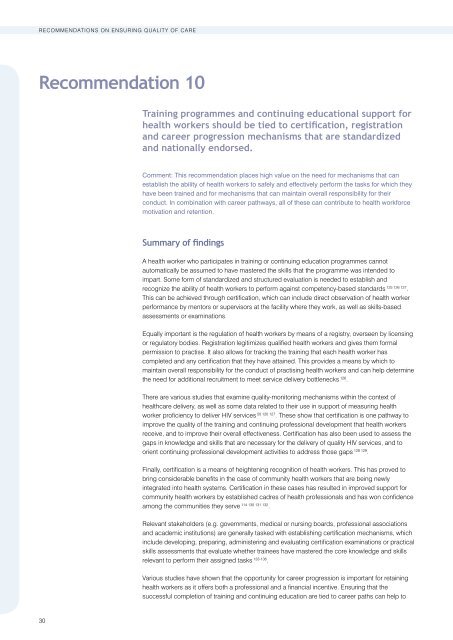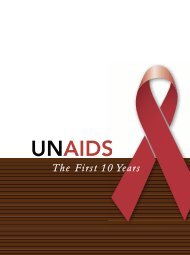Task Shifting - Global Recommendations and Guidelines - unaids
Task Shifting - Global Recommendations and Guidelines - unaids
Task Shifting - Global Recommendations and Guidelines - unaids
You also want an ePaper? Increase the reach of your titles
YUMPU automatically turns print PDFs into web optimized ePapers that Google loves.
<strong>Recommendations</strong> on ensuring quality of care<br />
Recommendation 10<br />
Training programmes <strong>and</strong> continuing educational support for<br />
health workers should be tied to certification, registration<br />
<strong>and</strong> career progression mechanisms that are st<strong>and</strong>ardized<br />
<strong>and</strong> nationally endorsed.<br />
Comment: This recommendation places high value on the need for mechanisms that can<br />
establish the ability of health workers to safely <strong>and</strong> effectively perform the tasks for which they<br />
have been trained <strong>and</strong> for mechanisms that can maintain overall responsibility for their<br />
conduct. In combination with career pathways, all of these can contribute to health workforce<br />
motivation <strong>and</strong> retention.<br />
Summary of findings<br />
A health worker who participates in training or continuing education programmes cannot<br />
automatically be assumed to have mastered the skills that the programme was intended to<br />
impart. Some form of st<strong>and</strong>ardized <strong>and</strong> structured evaluation is needed to establish <strong>and</strong><br />
recognize the ability of health workers to perform against competency-based st<strong>and</strong>ards 125 126 127 .<br />
This can be achieved through certification, which can include direct observation of health worker<br />
performance by mentors or supervisors at the facility where they work, as well as skills-based<br />
assessments or examinations.<br />
Equally important is the regulation of health workers by means of a registry, overseen by licensing<br />
or regulatory bodies. Registration legitimizes qualified health workers <strong>and</strong> gives them formal<br />
permission to practise. It also allows for tracking the training that each health worker has<br />
completed <strong>and</strong> any certification that they have attained. This provides a means by which to<br />
maintain overall responsibility for the conduct of practising health workers <strong>and</strong> can help determine<br />
the need for additional recruitment to meet service delivery bottlenecks 126 .<br />
There are various studies that examine quality-monitoring mechanisms within the context of<br />
healthcare delivery, as well as some data related to their use in support of measuring health<br />
worker proficiency to deliver HIV services 50 120 127 . These show that certification is one pathway to<br />
improve the quality of the training <strong>and</strong> continuing professional development that health workers<br />
receive, <strong>and</strong> to improve their overall effectiveness. Certification has also been used to assess the<br />
gaps in knowledge <strong>and</strong> skills that are necessary for the delivery of quality HIV services, <strong>and</strong> to<br />
orient continuing professional development activities to address those gaps 128 129 .<br />
Finally, certification is a means of heightening recognition of health workers. This has proved to<br />
bring considerable benefits in the case of community health workers that are being newly<br />
integrated into health systems. Certification in these cases has resulted in improved support for<br />
community health workers by established cadres of health professionals <strong>and</strong> has won confidence<br />
among the communities they serve 114 130 131 132 .<br />
Relevant stakeholders (e.g. governments, medical or nursing boards, professional associations<br />
<strong>and</strong> academic institutions) are generally tasked with establishing certification mechanisms, which<br />
include developing, preparing, administering <strong>and</strong> evaluating certification examinations or practical<br />
skills assessments that evaluate whether trainees have mastered the core knowledge <strong>and</strong> skills<br />
relevant to perform their assigned tasks 133-136 .<br />
Various studies have shown that the opportunity for career progression is important for retaining<br />
health workers as it offers both a professional <strong>and</strong> a financial incentive. Ensuring that the<br />
successful completion of training <strong>and</strong> continuing education are tied to career paths can help to<br />
30

















